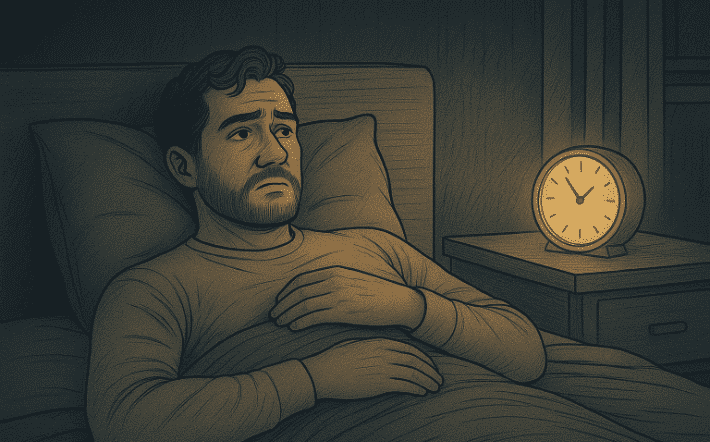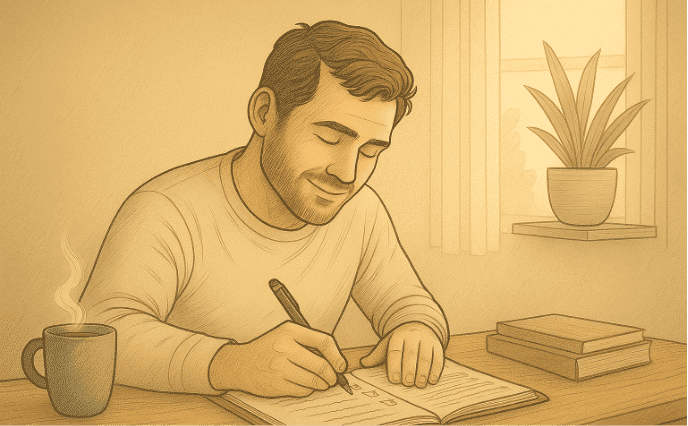Key Takeaways
- Persistent, uncontrollable worry that interferes with daily life may signal an anxiety disorder rather than normal concern.
- Anxiety often shows physically, racing heart, muscle tension, and digestive issues, highlighting the mind-body connection and the importance of managing stress.
- Difficulty falling or staying asleep can both result from and worsen anxiety, creating a harmful cycle that affects daily functioning.
- Avoidance provides short-term relief but gradually restricts life, impacting work, relationships, and overall quality of life.
- At A Mission for Michael, we provide personalized, compassionate care using evidence-based therapies like CBT, EMDR, and experiential approaches. Our programs integrate mental, emotional, and physical wellness to support lasting recovery.
Do You Have Anxiety?
Anxiety lives on a spectrum. While occasional nervousness before a big presentation or first date is completely normal, anxiety disorders go far beyond these temporary worries. Understanding the difference could be the first step toward finding relief from what might be controlling your life without you even realizing it.
Founded in 2010, A Mission For Michael (AMFM) offers specialized mental health care across California, Minnesota, and Virginia. Our accredited facilities provide residential and outpatient programs, utilizing evidence-based therapies such as CBT, DBT, and EMDR.
Our dedicated team of licensed professionals ensures every client receives the best care possible, supported by accreditation from The Joint Commission. We are committed to safety and personalized treatment plans.
1. Persistent Worry That Won’t Go Away
Everyone worries sometimes, but when worry becomes a constant companion, lingering from morning to night for months, it may signal generalized anxiety disorder (GAD). The key sign is excessive, uncontrollable worry about various situations for at least six months.
This isn’t just a normal concern about real problems. It’s a persistent fear that feels impossible to stop, often revolving around minor or unlikely events. You may find yourself preparing for worst-case scenarios or feeling dread without a clear reason.
When Normal Concern Becomes Excessive
Normal worry fades once the problem passes. Anxiety-based worry, however, lingers, feels disproportionate, and affects daily life. You might replay small issues in your mind, feel frozen by decisions, or struggle to focus because anxious thoughts take over. When worry interferes with daily functioning, it may have crossed into disorder territory.
The Physical Toll of Constant Worrying
Ongoing anxiety strains your body, too. Chronic stress hormones can weaken immunity, raise inflammation, and harm heart health. Over time, constant alertness leaves you physically drained, as your body isn’t built to stay in fight-or-flight mode indefinitely.
2. Physical Symptoms Your Body Is Under Stress
Many people seek medical help for physical issues only to learn that anxiety is the root cause. Your body signals distress when your mind feels overwhelmed, even if you’re not fully aware of it.
Racing Heart and Breathing Changes
A pounding or fluttering heart, shortness of breath, or chest tightness are common anxiety responses. These occur because your body’s stress system prepares you to face perceived danger. Breathing may become shallow or rapid, leading to dizziness or a racing heartbeat that fuels more anxiety.
Muscle Tension and Unexplained Aches
Chronic muscle tension, like clenched jaws, stiff necks, or sore shoulders, often stems from anxiety. This constant tightness can cause headaches, back pain, and general soreness without a clear physical cause. Once anxiety is treated, many people notice these pains fade.
Digestive Problems Linked to Anxiety
The gut–brain connection means anxiety can disrupt digestion, leading to nausea, stomach aches, diarrhea, or changes in appetite. Many notice these symptoms worsen during stress and ease during calm periods. Managing anxiety can often bring significant relief to digestive issues.
3. Sleep Problems That Follow You Day and Night

Sleep disturbances often worsen anxiety; addressing rest is key to breaking the cycle.
Anxiety and poor sleep feed each other in a difficult cycle—anxiety makes it hard to rest, while lack of sleep heightens anxiety the next day. If you’ve struggled to sleep for more than two weeks or dread going to bed, anxiety may be the cause.
Trouble Falling Asleep Despite Exhaustion
Anxiety often keeps the mind racing even when the body is tired. You might replay your day, worry about tomorrow, or feel restless in the quiet of the night. This mental hyperarousal prevents the calm needed for sleep, and over time, fear of not sleeping can make bedtime even more stressful.
Waking Up With Racing Thoughts
Anxiety can cause frequent awakenings or restless sleep, especially during dream-heavy REM cycles. Many people wake suddenly with anxious thoughts or dread. Morning anxiety is also common, rising cortisol levels can trigger worry before the day even begins, setting a tense tone that’s hard to shake.
4. Avoiding Places, People or Situations
Avoidance is a common but often overlooked sign of anxiety. It may start small, skipping a party or avoiding elevators, but it can grow until daily life feels limited. This pattern is seen in disorders like social anxiety, agoraphobia, and phobias.
Avoidance brings quick relief but strengthens anxiety in the long run. Each time you avoid something, your comfort zone shrinks, and facing similar situations becomes harder.
The Shrinking Comfort Zone
Anxiety gradually narrows your world, and avoiding crowds can turn into avoiding small gatherings, then staying home entirely. Many don’t realize how much their lives have contracted until freedom feels out of reach.
Impact on Work and Relationships
Avoidance can affect careers and relationships. You might pass on promotions, skip family events, or withdraw socially. Over time, this can lead to loneliness and misunderstanding, as others may see avoidance as disinterest rather than anxiety.
5. Feeling On Edge or Easily Startled
Living in a constant state of alertness is draining, yet many with anxiety feel this way daily. If small noises make you jump or you can’t fully relax even in safe spaces, you may be experiencing hyperarousal, when your nervous system stays on high alert despite no real threat.
The Hypervigilance Response
Hypervigilance means your body’s threat system is overactive. You might scan your surroundings for danger, react strongly to sudden sounds, or notice small details others overlook. While it can feel protective, it keeps your body stuck in stress mode, exhausting both mind and body.
Irritability and Short Temper
Constant tension makes emotional control harder. Small frustrations can trigger outsized reactions, leaving you snappy or easily annoyed. This irritability is often a sign of mental fatigue from living in a heightened state of anxiety.
6. Racing Thoughts and Difficulty Concentrating
Anxiety impacts focus, memory, and mental clarity. If you struggle to concentrate, remember details, or complete tasks, anxious thoughts may be interfering with your brain’s functioning.
When Your Mind Won’t Quiet Down
Racing thoughts, constant worries, what-ifs, and worst-case scenarios can make it hard to relax or enjoy activities. This mental chatter often worsens at night, contributing to sleep difficulties and leaving you mentally exhausted.
Memory Problems and Brain Fog
Anxiety consumes cognitive resources, causing forgetfulness, lost focus, and “brain fog.” These symptoms can be distressing but often improve once anxiety is addressed.
Catastrophizing: Expecting the Worst
Anxious thinking often jumps to worst-case scenarios. Minor mistakes or missed messages can trigger exaggerated fears, keeping stress levels high and reinforcing the belief that the world is unsafe.
7. Using Unhealthy Coping Mechanisms
When anxiety feels overwhelming, people often turn to quick fixes for relief. Unfortunately, these habits can worsen anxiety over time and create additional problems. Recognizing unhealthy coping strategies is key to addressing the root cause.
Excessive Procrastination as Avoidance
Procrastination often masks anxiety. Postponing stressful tasks offers short-term relief but leads to mounting responsibilities, creating more stress and reinforcing avoidance. Over time, this cycle can affect work, finances, and health, making anxiety harder to manage.
Compulsive Behaviors to Reduce Anxiety
Rituals or compulsions, like excessive checking, reassurance-seeking, or overplanning, temporarily ease anxiety but validate irrational fears. These behaviors can become time-consuming and rigid, interfering with daily life. Early recognition helps prevent them from becoming entrenched patterns.
Simple Steps to Start Managing Anxiety Today

Even minor changes to routine, journaling, sleep, or nutrition can have a big impact on mental well-being.
While professional support is crucial for significant anxiety, there are practical techniques you can start immediately. These strategies won’t cure anxiety, but they can provide meaningful relief and complement treatment. Consistent practice, just a few minutes several times a day, can noticeably reduce stress over time.
Breathing Techniques for Immediate Relief
Controlled breathing activates the body’s natural relaxation response. Try the 4-7-8 method (inhale 4, hold 7, exhale 8) or box breathing (equal counts inhale, hold, exhale, hold). Practicing daily, even when calm, helps these techniques work better during acute anxiety.
Movement and Exercise Benefits
Regular physical activity reduces anxiety by burning stress hormones, boosting endorphins, improving sleep, and increasing self-efficacy. Even short bursts, like a 10-minute walk or a few minutes of stretching, can have immediate calming effects.
Creating a Worry Schedule
Set aside 15–30 minutes daily to focus on worries. Outside this time, note concerns briefly and refocus on the present. This approach, from cognitive-behavioral therapy, helps contain anxious thoughts and reduce constant mental clutter.
Other Helpful Practices
- Grounding exercises: name 5 things you see, 4 you touch, 3 you hear, 2 you smell, 1 you taste.
- Limit caffeine, alcohol, and sugar.
- Keep consistent sleep and meal routines.
- Use a thought journal to track triggers and patterns.
- Connect with supportive people who understand what you’re experiencing.
When to Get Help for Your Anxiety
Seeking help means taking charge of your wellbeing. If anxiety persists for more than two weeks and interferes with daily life, relationships, or work, it’s time to reach out. Early support often leads to better, faster recovery.
Normal Worry vs. Anxiety Disorder
Normal worry is temporary, proportionate, and fades once the stressor passes. Anxiety disorders involve persistent, excessive worry that continues even without clear triggers and disrupts daily functioning. Long-lasting, escalating anxiety that resists self-management is a signal to seek professional support.
Therapies That Work
Cognitive-behavioral therapy (CBT) is highly effective, helping you identify and change thought patterns that fuel anxiety. Other approaches include exposure therapy, mindfulness-based stress reduction, and talk therapy. Many people combine therapies for the best results, specific to their needs. Improvement usually happens gradually, so patience and consistent practice are key.
A Mission for Michael: Compassionate, Evidence-Based Mental Health Care

From residential to virtual programs, AMFM meets you where you are on your path to wellness.
At A Mission for Michael (AMFM), we provide compassionate, individualized care for adults managing anxiety, depression, trauma, and complex psychiatric conditions. We go beyond traditional treatment, focusing on each person’s strengths, history, and unique needs.
Through our residential, partial hospitalization, intensive outpatient, and virtual programs, we create tailored therapy plans using evidence-based methods like CBT, EMDR, DBT, and experiential therapies such as art or animal-assisted therapy. With a 2:1 staff-to-client ratio, we ensure personalized attention in comfortable, home-like environments.
We emphasize holistic wellness, integrating mental, emotional, and physical health into every treatment plan. Our programs include nutrition, movement, community engagement, and skill-building to help clients rebuild confidence, resilience, and meaningful connections.
We guide you through insurance and financial options to make care accessible, working with most major plans. From your first assessment to ongoing treatment adjustments, we monitor progress closely and adapt your care to meet your evolving needs.
At AMFM, we see the person behind the diagnosis. We combine expertise, empathy, and innovative therapies to support lasting mental health transformation and help our clients reclaim their lives.
Frequently Asked Questions (FAQs)
What are the early signs of an anxiety disorder?
Early signs include persistent worry, restlessness, irritability, difficulty concentrating, sleep disturbances, physical tension, and avoidance behaviors. Recognizing these patterns early can help prevent worsening symptoms and improve treatment outcomes.
Are anxiety and stress the same thing?
Stress is typically situational and temporary, while anxiety is a persistent feeling of worry or fear that may occur even without an immediate threat. Anxiety often affects thinking, emotions, and daily functioning.
How does avoidance worsen anxiety?
Avoiding feared situations gives short-term relief but reinforces fear over time. This shrinking comfort zone increases social, professional, and daily limitations, making anxiety more entrenched and harder to manage.
Does anxiety only affect adults?
No. Children, teens, and even young adolescents can experience anxiety, often showing as irritability, school avoidance, physical complaints, or social withdrawal. Early recognition and treatment are crucial for long-term well-being.
Can lifestyle changes help manage anxiety?
Yes. Regular exercise, quality sleep, balanced nutrition, mindfulness, and structured routines can help reduce anxiety and support therapy. At A Mission for Michael, we integrate these lifestyle strategies into personalized treatment plans for lasting mental health and overall well-being.









